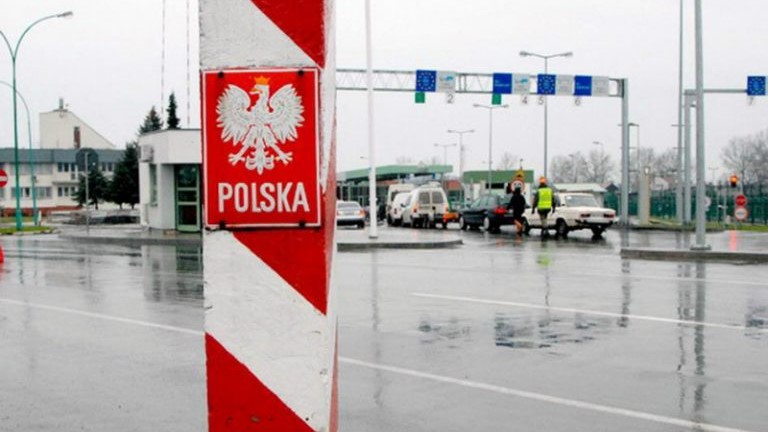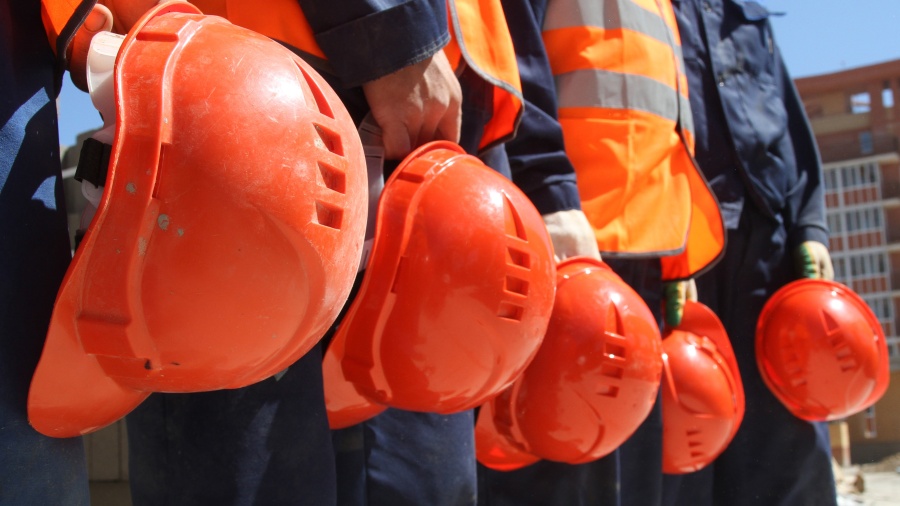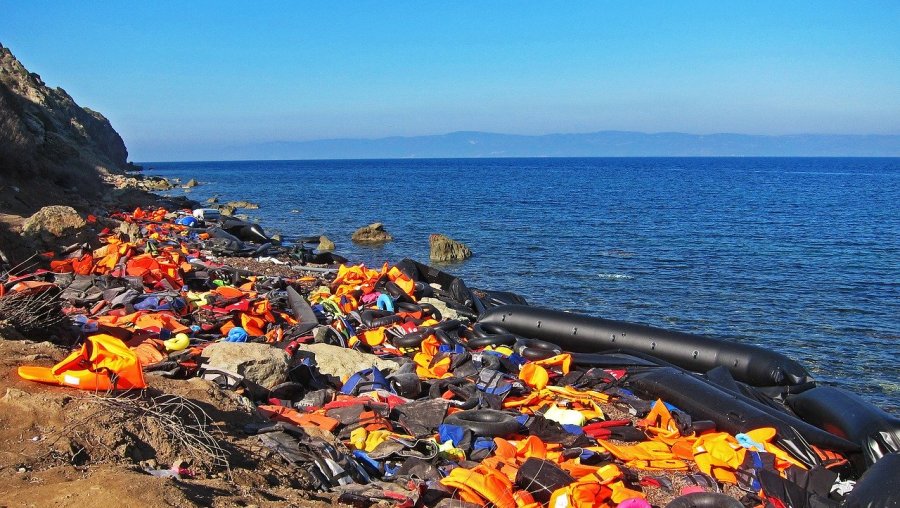
Source: embaperu.ch
Some time ago we published an article by Martha Szczepanik from the Polish Helsinki Foundation about the refugee crisis at the border crossing between Belarus and Poland caused by Poland’s policy of denying entry to asylum seekers—mostly to refugees from the Russian North Caucasus republics seeking asylum in Poland and other European countries. Today, we present a perspective from the other side of the border by interviewing Enira Bronitskaya, coordinator of assistance to foreign nationals and stateless persons at the Human Constanta NGO (Belarus).
Human Constanta was formally established two years ago, in October 2016, but began operating a year before. A number of human rights activists working in Belarus with other NGOs became concerned about the rights of foreign nationals, migrants and refugees in the country. Shortly before the 2014 World Ice Hockey Championship in Minsk, police conduced “cleansing” operations in the city. As numerous foreign tourists were expected to visit Belarus, a large number of immigrants were placed in a temporary detention center at Okrestina Street in Minsk. Foreign nationals [with immigration issues] had been held in that center before, but this time, far more information became available as to the duration and conditions of their detention before deportation. It turned out that they had no procedural rights whatsoever, no one cared about their plight, and no human rights organizations were really trying to help them.
Foreigners in Minsk: the World Hockey Championship and its unexpected consequences
So in 2014, the authorities were “cleansing” Minsk of everyone they considered undesirable. These included the city’s homeless, many of whom were arrested on administrative charges. The police conducted ID checks at the slightest suspicion and apprehended people who did not have residence registration or other required paperwork, which is an administrative offense in Belarus. A fair number of people living in Minsk was arrested in this way; some had expired residency permits, others did not have any papers at all. Due to ID checks before the championship, more people than usual were found out and placed in detention.
For those charged with violation of immigration law this meant expulsion in 99% of cases. If ID papers are missing or expired, it can take quite a while to confirm a person’s identity. Serious problems with identity verification can also arise if a foreigner’s country of origin does not have an embassy in Belarus. There was a case in my practice where I helped a woman from the Comoro Islands who was detained at Okrestina. There are no separate detention facilities for immigrants in Belarus—they are held either at Okrestina in Minsk (the only center for administrative offenders in the country) or in regular pre-trial detention facilities alongside criminal offenders elsewhere in the country. As there are no established timelines for such detention, immigrants can be held indefinitely in the center for administrative offenders or in pre-trial detention facilities. These are not designed to accommodate people for a long time, and can be especially harsh if the detainee does not have anyone outside of prison bringing them food, clothes and other necessities.
For example, that woman from the Comoro Islands spoke only French and had been held at Okrestina for six months. No one talked to her, she had no communication whatsoever with the outside world and did not understand what she was doing there or why she had been detained. When immigration police officers from the Department for Citizenship and Migration (DCM) first visit a detainee they are supposed to bring a translator, which they usually do. But unless the detainee speaks a widespread language things can go wrong. There was a case of a group of Iraqis who spoke a certain dialect which the translator could not understand, although he was also from Iraq; formally, however, the visiting officer was accompanied by a translator, and this fact was documented in the act of detention and records of the first interview. After the initial interview, a detainee can wait for months for further communication.
The Brest crisis
Just as we decided to set up Human Constanta, in the early autumn of 2016, we learned about the situation in Brest where a large number of asylum seekers, most but not all of them from the Chechen Republic, were stuck at the border, unable to enter Poland. There was in fact a refugee tent camp there. This had never happened before, and no one could understand what was going on. Generally, the presence of foreigners in Brest was a familiar thing, but it had never even occurred to us living in Minsk how many people sought asylum in Europe and what problems these asylum seekers faced. The situation there had largely gone unnoticed—until Poland refused to admit refugees due to changes in its immigration policy.
At first we had the illusory idea that the problem was a lack of publicity: once we went there and figured it all out, wrote about it and made it public, the matter would be resolved in a couple of days or maybe weeks. Two years have passed since.
In fact, we had only a very limited understanding of what was really going on there. Our mission was spontaneous and volunteer-driven. We called out to friends and colleagues telling them that something was wrong at the border, that humanitarian and legal assistance was needed, and that we should go out there and help. Quite a number of people responded. We went to Brest and started monitoring the train station, talking to people, providing humanitarian assistance and legal advice. We also established contacts with Polish NGOs to gain a better understanding of how we could help the asylum seekers cross the border. It has always been our position that our role does not involve deciding whether or not they are entitled to refugee status. We proceed from the idea that everyone has the right to seek international protection. Therefore, in most cases, we do not need to learn the details of their stories. People may face different circumstances and sometimes do not want to disclose them.
We have used a variety of approaches over these two years. At some point, we were interviewing everyone. Today, we only ask them about their reasons for leaving their home, but if they do not wish to give us details, we make do with a brief answer such as “persecution”. However, at some point in the past, we insisted on helping them write down their entire story and having it translated into Polish, so they could hand this document to Polish border guards when crossing the border. The documents were marked as prepared by Human Constanta. They helped for a while: we could see that people who had such papers were more likely to be admitted than those who did not. But the situation at the border has been changing. Today, border guards allow one or two families per day to cross the border, just as two years ago. But the way in which these families are selected has changed.
According to our estimates, there were some 3,000 asylum-seekers in Brest when we started working there. Most of them were from the North Caucasus, and the majority came from Chechnya. Both then and now, there have been asylum-seekers from other regions of Russia and other countries such as Tajikistan, Kyrgyzstan, Syria, Afghanistan, Egypt… They were not many of them in the past, and today there are even fewer.
Now, almost two years later, there are no more than a hundred transit refugees in Brest. At some point, we started seeing their numbers decline. Fewer people were coming to Brest. Some were unable to cross the border ran out of money and left: each “attempt”, as they call it, costs money. They share information, and at some point, news spread that the border was closed, and that the flow of asylum-seekers has since decreased. Many went back home, and fewer newcomers have been arriving.
In the past, we have seen families make 70 or so attempts at crossing the border (78 attempts is the record). Today, the average number of attempts does not exceed 20 (if a family can afford it), and after numerous attempts, families are usually allowed to enter Poland. Just as before, border guards admit one or two families per day, but since fewer families are applying, their chances are better today, as strange as that may sound.
How the Brest authorities deal with the problem
The train ride from Brest to the border takes 20 minutes. Most asylum-seekers rent apartments or hostel accommodation in Brest before attempting the journey.
The city authorities are monitoring the situation. We used to have some sort of cooperation with them when there were more asylum-seekers. For example, at some point we did not have an office in Brest or any other base we could use to distribute humanitarian aid. (It is always better to invite people to a distribution center than go out to them to the railway station carrying aid goods). It was winter, there were plenty of donations, and the asylum-seekers really needed help. We contacted the local Department for Citizenship and Migration and they agreed to assist us in finding a suitable place. When they see that we are helping them solve problems or relieve social tension, they agree to cooperate. Last autumn, transit refugees were about to stage a sit-down protest outside the Polish consulate, and the local authorities came to us for help: “Could you talk it out with them, since you have more contacts with them?” The authorities also attempted to talk to the protesters, and the head of DCM visited the Polish consulate to inform the consul directly about the situation.
Generally, however, the Belarusian authorities continue to treat asylum-seekers as “persons planning to engage in illegal migration.” In an attempt to prevent this behavior, the authorities shorten the duration of foreigners’ permitted stay in Belarus or expel them with a ban on future entry. Every now and then, the authorities mark passports with an entry ban stamp (based on the rule which prohibits using the Republic of Belarus for illegal migration to a third country). We find such bans to be arbitrary, since everyone understands that these people are going to Poland to apply for refugee status. Only a few days ago, immigration officers in Brest put no-entry stamps on the passports of three families, while adding informally that the authorities were on the lookout for people who had made ten or more trips to the border. We also know from unofficial sources that the immigration service has been given performance targets for the number of foreigners to be expelled from Belarus, and that most foreigners in Brest are those seeking to apply for asylum in Poland, [which makes asylum-seekers an easy target].
While Russian nationals do not require registration to stay in Belarus, citizens of other countries such as Tajikistan or Kyrgyzstan may only stay five days without registration and then they must obtain registration which is time-limited. As they apply for extension of their registration, DCM officers can guess by looking at their passports that they have been making “attempts” to cross the Polish border. The DCM then limits their permitted stay, often followed by a ban on entering Belarus for the next 3-5 years.
Crisis dynamics and international cooperation
This summer in Brest, we have seen fewer, as we call them, “old families.” We had expected the number of families and individuals to increase over the summer; the Chechens were saying that more people would arrive after Ramadan. However, the number of asylum-seekers in July was the lowest ever in two recent years. Earlier, in spring, there were around 300-500 people. Now asylum seekers spend one or two months here while previously three months was the norm. Single people are more mobile than families and tend to spend less time at the border (many of them are able to make entry attempts every day). Families often have to delay their next attempt if a child falls ill, for example.
We know the story of a family banned from subsequent entry in Belarus. On the last day of their legal stay here, they were allowed to enter Poland. The woman was pregnant. We have been discussing this case with our Polish colleagues to whom we refer asylum-seekers for further assistance. This includes counseling at the refugee camp in Poland, making sure the local procedure is observed, and educating newcomers about the asylum interview. We have been collaborating with a few Polish organizations, such as the Helsinki Foundation and the Association for Legal Intervention. Four complaints lodged last summer with the European Court of Human Rights were a notable example of such collaboration: our lawyer filed a complaint against Poland—an unprecedented case for Belarus, which is not part of the Council of Europe. Sometimes we serve as the “hands and feet” of our Polish colleagues, when our client is on this side but we lack the expertise or capacity to handle the case on our own and delegate part of the legal work to our Polish colleagues.
Other than our organization, virtually no one is working on these issues in Belarus. Of course, UNHCR and its partner organizations have a local office, but they focus mainly on refugees seeking asylum in Belarus. Incidentally, some of those who have attempted unsuccessfully to enter Poland eventually choose to stay in Belarus and apply for refugee status here. Belarus does not grant refugee status to Russian nationals, but some Russians decide to stay here anyway. Our organization does not necessarily consider Belarus to be safe for all Russians, but, for example, a woman trying to escape from domestic violence may find safety here (if she is certain that her husband won’t look for her in this country). We have been helping in such cases as well, e.g. by explaining local procedure. Our focus is not just on refugees; we work more broadly to protect the rights of foreign nationals in Belarus. While they are here, we make sure that their rights are respected. Should they need advice on how they can legally stay in Belarus or what procedures concern them, we provide such advice. We have an office in Minsk providing legal services throughout the country, and one here in Brest specifically for this area.
Volunteers and partners
Some trained lawyers have volunteered to help us pro bono. Their assistance can range from drafting a single complaint to monitoring a situation on an ongoing basis. Since the issues we are dealing with can get quite technical, we really need practitioners with relevant experience and expertise. When someone volunteers to help us temporarily, we define the scope of their work. We have several attorneys volunteering for us, but there is a problem with pro bono legal practice in Belarus. 1Belarusian law does not provide for pro bono legal assistance. While it is not explicitly prohibited, the applicable regulations are usually interpreted in a way that any legal assistance provided by an attorney, except that subsidized by the state, must be fee-based. We are currently working on the case of Mehrdad Jamshidiyan (link in Russian), an Iranian. Belarus has repeatedly tried to expel him to Iran where he faces torture and death penalty. The attorney who has been assisting him for several years is willing to do it pro bono, but it is extremely difficult to arrange.
We have established contacts with the legal clinic of Brest State University. I have a lot of experience working with legal clinics on a variety of issues. When I first came to Human Constanta, I said from the start that we should engage legal clinics. But there is a limitation: they can only provide advice to the members of their target audiences, in accordance with their charter. In Brest, we engage with them to educate students about the situation and improve their general knowledge. Since we consider our target group to include foreigners in general, not limited to refugees, we encourage legal clinics to provide advice to foreign students. Every now and then, we receive requests for assistance from foreign students on matters such as expulsion from school, and some ask for help with staying in Belarus after graduation. Legal clinics could take up these kind of assignments. A legal clinic in Brest has expressed interest in providing such assistance after our training session “Migration Made Simple.” We have contacted other clinics about it, but not all of them are prepared to take it up at the moment. Nevertheless, it may be a good opportunity for cooperation since students are a target group for legal clinics.
The problem persists
While the acute crisis has ended, the problem has not been resolved. People continue to arrive at the border, though in much smaller numbers. On one hand, this gives them a better chance of entering Poland, but on the other hand, difficult situations continue to arise. Some of these families suffer from psychological problems. We are currently helping a family whose son has already migrated to Europe. His mother is at the border trying to get through. She has made several unsuccessful attempts. Her son has come to the border crossing trying to convince the Polish commanding officer to let her in. Both are in a critical psychological state which is so bad that the son has said, “If I cannot take my mother to Europe along with me, I will kill myself.” There was a suicide attempt in another family, also from Chechnya. Therefore, I cannot say that the problem has been solved. Admittedly, it is not as acute now as it was two years ago, but we are still unable to help people in a substantial way. We continue to explain to asylum seekers what to do and how to do it, and we are still providing humanitarian assistance, although it was not our priority to begin with. Indeed, according to my colleagues in Brest, they tend to spend 80% of their work time providing humanitarian assistance and just 20% offering legal advice. We continue to lodge complaints against the Polish commanding officer, but by and large this has not made much impact. So today we are trying to help in a number of other ways, e.g. by offering drawing classes for children. Most people come over in big families with children. We have seen children here who have never made a drawing in their lives.
Similar Posts:
- Lawyers in the “Prisoners of Sheremetyevo” case appeared before the European Court’s Grand Chamber
- It is like that phrase “don’t think about white bear”
- Vera Vrubel: “Here I Was, Mad as Hell”
- “Violence is usually revealed only after the woman is murdered”
- Galina Arapova: “You get the uncomfortable feeling of trying to break a wall with your head…”
References
| ↑1 | Belarusian law does not provide for pro bono legal assistance. While it is not explicitly prohibited, the applicable regulations are usually interpreted in a way that any legal assistance provided by an attorney, except that subsidized by the state, must be fee-based. |
|---|


